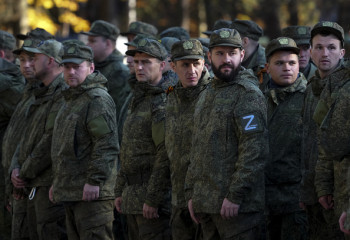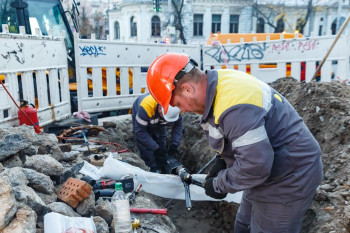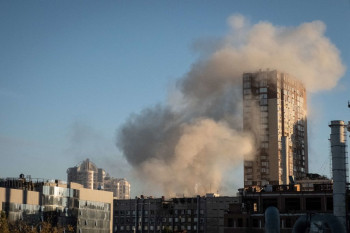Ukraine war latest: NATO says Russia trying to ‘freeze’ war in Ukraine for ‘bigger offensive’ next spring
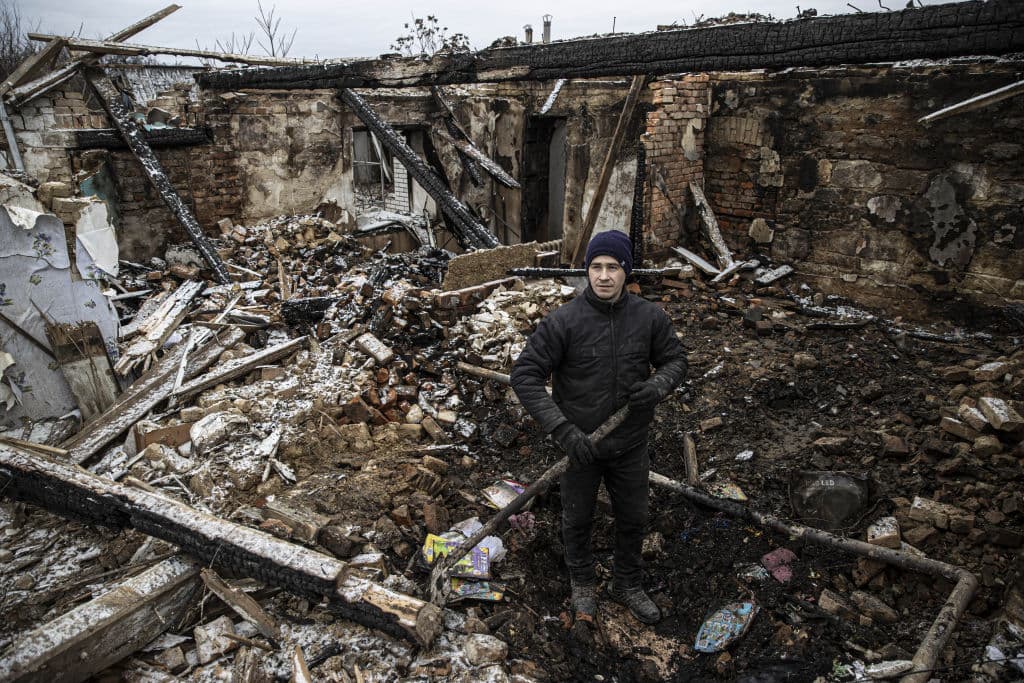
Key developments on Dec. 7
- NATO chief: Russia trying to ‘freeze’ war in Ukraine for ‘bigger offensive’ next spring
- Putin: The war in Ukraine ‘might be a long process’
- Zelensky: At least 10 killed, ‘many’ wounded in Russian shelling of Kurakhove, Donetsk Oblast
- Ukrenergo: Ukraine still faces 'significant' energy deficit
Russia is trying to “freeze” the war in Ukraine to prepare for “a bigger offensive next spring,” NATO Secretary General Jens Stoltenberg said on Dec. 7.
“What we see now is Russia actually trying to have some kind of ‘freeze’ of this war at least for a short period of time so they can regroup, repair, recover,” Stoltenberg said during a conference hosted by the Financial Times.
The NATO chief’s assessment comes nearly a month after Russia suffered a humiliating defeat in southern Ukraine, where it was forced to withdraw from the only regional capital, Kherson, that it had captured since the February invasion.
For the past five months, Russia has failed to achieve any major victory in Ukraine despite its high casualty rate. The current epicenter of the battle is in the Bakhmut sector in the eastern Donetsk Oblast as Russian troops mass to encircle and capture the strategically insignificant city.
Ukraine’s Eastern Military Command spokesman Serhiy Cherevaty claimed on Dec. 4 that Russia was losing 50-100 soldiers daily in the Bakhmut area, with a similar injury rate. The loss of Ukrainian troops, however, is also assumed to be high.
At the Financial Times Global Boardroom conference on Dec. 7, Stoltenberg also said that he had "no more information" about Moscow’s accusations of Ukrainian drone attacks on Russian military airbases earlier this week.
The alleged Ukrainian drone attacks occurred on Dec. 5 when explosions were reported at two airbases 500-700 kilometers deep inside Russia, hinting at Kyiv’s ability to strike targets at such distances.
Ukraine has not officially claimed responsibility for the attacks.
Stoltenberg elaborated without pointing fingers that it’s important to “understand this in the wider context,” where Russia is launching daily attacks on critical infrastructure in Ukrainian cities.
“What Russia tries to do is to weaponize winter, to deprive civilian Ukrainians of water, of electricity, of heating, when they're now going into winter,” Stoltenberg said.
“Ukraine has the right to defend itself against these kinds of attacks.”
Earlier on Dec. 6, U.S. State Department spokesperson Ned Price said that Washington was not “enabling” or “encouraging” Ukraine to attack targets inside Russia.
Asked about the possibility of peace agreements, Stoltenberg said that “Russia has shown no sign of engaging in negotiations which are respecting the sovereignty and the territorial integrity of Ukraine,” but insisted that it was not up to Brussels to decide.
“It has to be Ukraine that decides when and the conditions for negotiations,” he told at the event.
Back in Moscow, Russian President Vladimir Putin signaled that he was preparing for a prolonged war, acknowledging that “this might be a long process.”
Putin added that half of the 300,000 conscripts drafted under what he introduced as "a partial mobilization" on Sept. 21 were already deployed in Ukraine.
Mounting casualties
Russia ramped up its attacks on the eastern Donetsk Oblast on Dec. 7.
Russian shelling had killed at least 10 and wounded “many” in Kurakhove city in the central part of Donetsk Oblast, President Volodymyr Zelensky said. He added that a market, bus station, gas stations, and residential buildings were under fire.
“Terrorists are inhuman. And they will be held to account for it,” Zelensky said on Telegram.
In the region’s liberated village of Yampil near Luhansk Oblast, Russian forces shelled the central square when humanitarian aid was being handed out, wounding three, according to Donetsk Oblast Governor Pavlo Kyrylenko.
The south of Ukraine also suffered from heavy Russian shelling. Kherson Oblast Governor Yaroslav Yanushevych said that liberated parts of the region were shelled 51 times over the past day, killing two civilians and wounding one.
Meanwhile, two communities near Zaporizhzhia city were hit with Russian S-300 missile systems and drones, Zaporizhzhia Oblast Governor Oleksandr Starukh reported. He added that three civilians were wounded, including a 15-year-old girl.
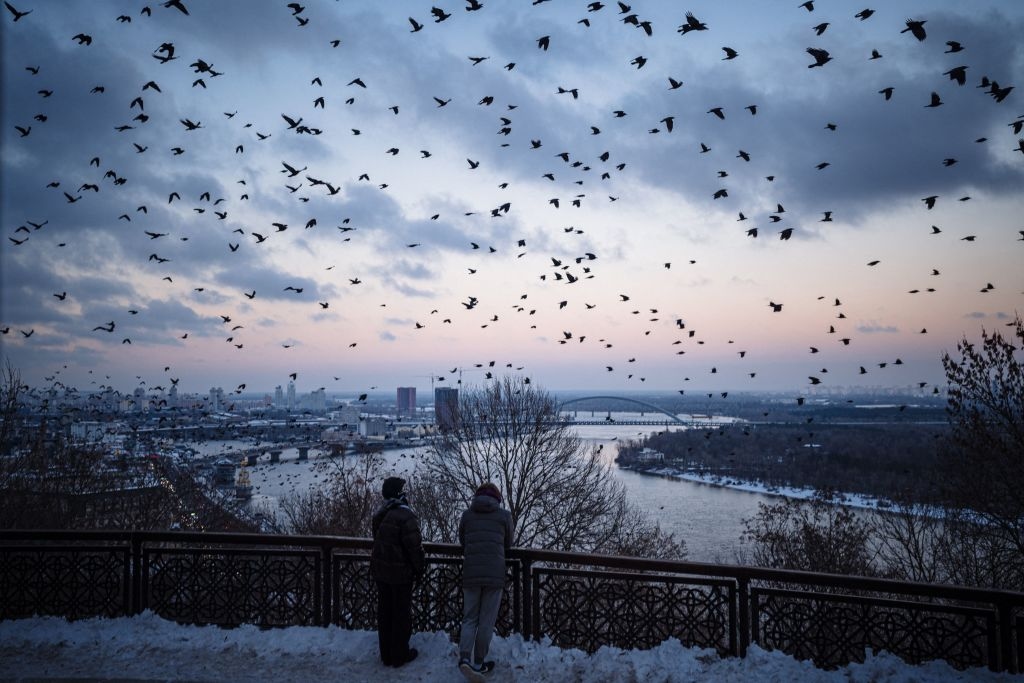
Significant energy deficit
Russian forces repeatedly fired upon power facilities in the east of Ukraine overnight, further complicating the already difficult situation with electricity on the ground, the state grid operator Ukrenergo said on Dec. 7.
Nationwide, Ukraine still faces a “significant” energy deficit following Russia’s Dec. 5 mass attack, and some regions were forced to roll emergency shutdowns to maintain balance, Ukrenergo added.
As of Dec. 6, Ukraine faced a 19% electricity deficit, following Russia’s latest of series of large-scale attacks targeting energy infrastructure.
Ukrainian cities continue to face scheduled and emergency power outages to conserve electricity as the weather gets colder.
Russia’s recent attacks have damaged 350 natural gas facilities, causing a loss of gas production capacity worth about $700 million, according to Oleksii Chernyshov, Head of Naftogaz, Ukraine's energy monopoly.
“We have started the heating season – we expect it to be the hardest ever," Chernyshov said at an event of the European Bank for Reconstruction and Development, as quoted by Reuters.
Next EU sanctions
On the diplomatic front, Ukraine’s Foreign Minister Dmytro Kuleba called on the EU to “impose stiff sanctions on Russia’s missile production and anything used to launch deadly missiles at Ukraine.”
Kuleba said he had sent a letter concerning his sanctions request to European Union foreign policy chief Josep Borrell.
On Dec. 7, EU ambassadors were due to discuss the bloc’s ninth sanctions package to punish Moscow for waging war against Ukraine.
In Brussels, European Commission President Ursula von der Leyen said the EU’s executive arm proposed expanding its sanctions list with “almost 200 individuals and entities.” She added that it would include the Russian Armed Forces, individual officers, and defense industrial companies, as well as political parties and ministers.
"Russia continues to bring death and devastation to Ukraine," von der Leyen said in a statement. Russia “is deliberately targeting civilians and civilian infrastructure, seeking to paralyze the country at the beginning of the winter.”
The EU’s new sanctions package aims to restrict Russia’s access to drones and other unmanned aerial vehicles by banning “direct exports of drone engines to Russia and the export to any third countries, such as Iran, which could supply drones to Russia,” von der Leyen said.
The ninth sanction proposal comes as the EU, G7, and Australia implemented a maximum $60 per barrel price cap on Russian seaborne oil starting this week.

